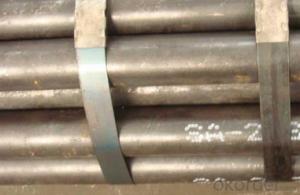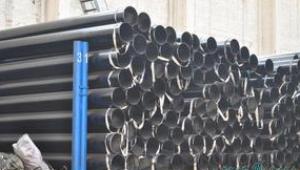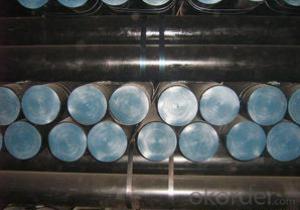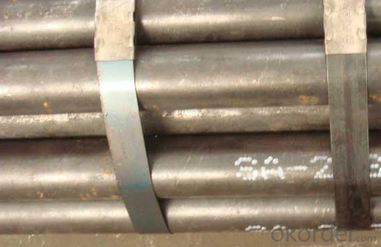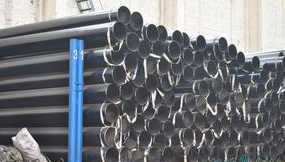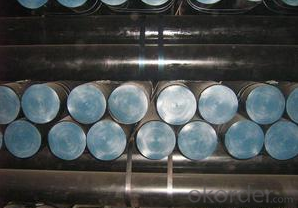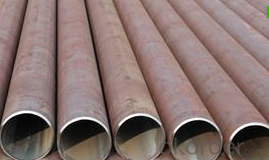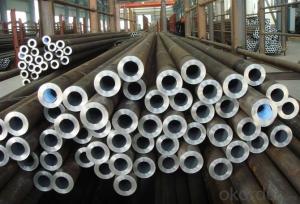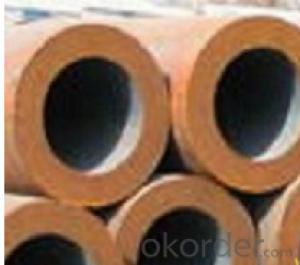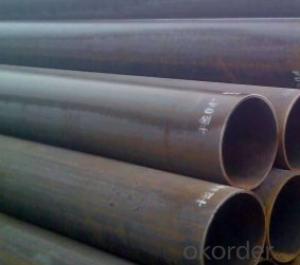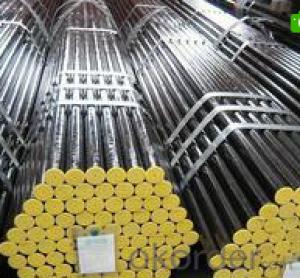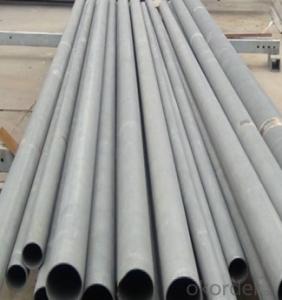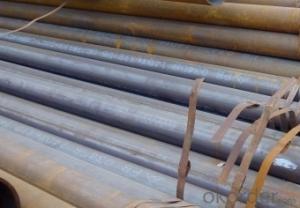Schedule 40 ASTM A53 API 5L GR.B Carbon Seamless Steel Tubes X52 CNBM
- Loading Port:
- Qingdao
- Payment Terms:
- TT OR LC
- Min Order Qty:
- 10 pc
- Supply Capability:
- 30 pc/month
OKorder Service Pledge
OKorder Financial Service
You Might Also Like
Quick Details
| Thickness: | 2.0 - 85 mm | Section Shape: | Round | Outer Diameter: | 17 - 914.4 mm |
| Secondary Or Not: | Non-secondary | Application: | Oil Pipe | ||
| Technique: | Hot Rolled | Certification: | API | Surface Treatment: | VARNISH PAITING |
| Special Pipe: | API Pipe | Alloy Or Not: | Non-alloy | END: | PLAIN,BEVELED OR THREADED |
| Grade: | 10#,20#,16Mn,A106(B,C),A210,A335 P5,A335 P91,A53(A,B),API J55,API K55,Q195,Q235,Q345,St37,St52,10#-45#,A53-A369,API J55-API P110,Q195-Q345,ST35-ST52 | Standard: | API 5CT,API 5L,ASME B36.19M-2004,ASTM A106-2006,ASTM A179-1990,ASTM A182-2001,ASTM A53-2007,BS 1387,DIN 1629/3,DIN EN 10216-1-2004,GB 5310-1995,GB/T 3091-2001,GB/T 8162-1999,GB/T 8163-1999,JIS G3454-2007,API,ASTM,BS,DIN,GB,JIS |
Packaging & Delivery
| Packaging Detail: | standard packing suitable shipping by sea.fixed length as customers' requirements, or SRL or DRL. Varnish, painting or galvanized, or FBE ,2PE,3PE 3pp coating,bevelled/plain/threaded ends with caps, packing in bundle (OD smaller than 141.3mm) big sizes packing in loose, marking as required. Shipped by sea,by air,by train . or some samples shipped by DHL,EMS,TNT,FEDEX ect. Length shorter than 5.85m should be shipped by 20' container, 5.85-12m shipped by 40' container. |
| Delivery Detail: | 7-35 days after advance payment |
Product Description
Seamless steel pipes, a large number of used pipes conveying fluids, such as transport oil, natural gas, gas, water pipes and some solid materials, and so on. Compared to other steel and solid steel bar, the same torsional strength in bending, lighter, is an economic cross-section steel, widely used in the manufacture of structural parts and mechanical parts, such as drill pipe, automotive drive shafts, bicycle rack and construction using steel scaffolding ring with steel pipe manufacturing parts, can improve material utilization, simplify the manufacturing process, saving material and machining time, such as bearing rings, jack sets, has been widely used to manufacture steel. Steel or a variety of conventional weapons indispensable material, gun barrels to make steel. Steel shapes in different cross-sectional area can be divided into tube and shaped tubes. As in the perimeter of equal conditions, the largest area of a circle with a circular tube can carry more fluid. In addition, the circular cross section to withstand internal or external radial pressure, the force is uniform, so the vast majority of the pipe is pipe.
- Q: What is the difference between carbon steel and alloy steel pipes?
- Carbon steel pipes and alloy steel pipes are two distinct types of steel pipes, characterized by their composition and properties. Carbon steel pipes, consisting mainly of carbon and iron, incorporate small quantities of other elements such as manganese, silicon, and copper. These pipes are renowned for their robustness and durability, making them a favored option in industries like construction, oil and gas, and automotive. Carbon steel pipes are relatively low-priced and exhibit commendable resistance to corrosion. In contrast, alloy steel pipes are produced by introducing additional alloying elements to carbon steel. These alloying elements encompass chromium, nickel, molybdenum, vanadium, and others. The incorporation of these elements augments the steel's properties, resulting in increased strength, superior corrosion resistance, and enhanced heat resistance. Alloy steel pipes are commonly employed in applications involving high temperatures and pressures, such as power plants, refineries, and chemical plants. Regarding cost, alloy steel pipes generally incur higher expenses compared to carbon steel pipes due to the inclusion of supplementary alloying elements. Nevertheless, the added advantages in terms of performance and longevity often justify the elevated cost. To summarize, the primary distinction between carbon steel and alloy steel pipes lies in their composition and properties. Carbon steel pipes primarily consist of carbon and iron, while alloy steel pipes contain additional alloying elements to enhance their properties. Carbon steel pipes are celebrated for their strength and affordability, whereas alloy steel pipes offer improved strength, corrosion resistance, and heat resistance.
- Q: Are steel pipes resistant to ultraviolet (UV) radiation?
- No, steel pipes are not inherently resistant to ultraviolet (UV) radiation.
- Q: Can steel pipes be used for structural applications?
- Yes, steel pipes can be used for structural applications. Steel pipes have high strength, durability, and resistance to various environmental conditions, making them suitable for structural purposes. They are commonly used in the construction industry for the fabrication of buildings, bridges, and other structures. Steel pipes have excellent load-bearing capacity and can withstand heavy loads, making them ideal for supporting structures and transferring loads. Additionally, steel pipes can be easily fabricated, welded, and connected, allowing for efficient construction. Overall, steel pipes are a reliable and cost-effective option for structural applications.
- Q: Could you tell me what difference between SC galvanized steel pipe and MT wire pipe?
- Hot galvanized steel pipe galvanized color silver plated SC.MT wire pipe galvanized color silver plated or silver plated cold yellow fever.
- Q: How are steel pipes used in stadium construction?
- Steel pipes are commonly used in stadium construction for various purposes such as structural support, roofing, and plumbing systems. They provide strength and durability to the overall structure of the stadium, allowing it to withstand heavy loads and adverse weather conditions. Steel pipes are also used for the installation of HVAC systems, water supply lines, and drainage systems within the stadium.
- Q: How are steel pipes measured and sized?
- Steel pipes are commonly measured and sized based on their outer diameter (OD) and wall thickness. The OD is measured using a caliper or tape measure, while the wall thickness can be determined by either a micrometer or ultrasonic thickness gauge. This information is crucial for classifying pipes into various standardized sizes, such as schedule or nominal pipe sizes, which are widely used in the industry.
- Q: Can steel pipes be used for transporting slurry?
- Yes, steel pipes can be used for transporting slurry. Steel pipes are known for their durability and strength, making them suitable for handling abrasive materials like slurry. The smooth interior surface of steel pipes helps to minimize friction and prevent clogging, ensuring efficient transportation of slurry. Additionally, steel pipes can withstand high pressure and are resistant to corrosion, making them a reliable choice for slurry transport.
- Q: What is the load-bearing capacity of steel pipes?
- The load-bearing capacity of steel pipes is influenced by a range of factors, including diameter, wall thickness, and steel grade. In general, steel pipes exhibit excellent load-bearing capacity due to their inherent strength and durability. The determination of load-bearing capacity involves utilizing engineering calculations and testing techniques. These calculations take into account factors such as the applied load, pipe dimensions, and material properties of the steel. To accurately ascertain the load-bearing capacity of specific steel pipes for a particular application, it is crucial to refer to engineering standards, guidelines, and consult with a structural engineer.
- Q: Seamless steel pipe and welded pipe what is the difference?
- Identification method: see the inside of the pipe, because the external, will deal with the welded pipe is inside a gap, you can see some, some, is not easy to see, you can slowly by hand touch, or see the specifications are relatively thin, welded pipe
- Q: Can steel pipes be used for underground gas storage?
- Yes, steel pipes can be used for underground gas storage. Steel pipes are commonly used for transporting and storing various types of gases, including natural gas, due to their strength, durability, and resistance to corrosion. They are able to withstand high pressures and can be designed to meet the specific requirements of underground gas storage facilities. Additionally, steel pipes can be coated or lined with materials to further enhance their resistance to corrosion and to prevent any potential leaks. However, it is important to ensure that proper safety measures and regulations are followed during the construction and operation of underground gas storage facilities to prevent any potential risks or hazards.
Send your message to us
Schedule 40 ASTM A53 API 5L GR.B Carbon Seamless Steel Tubes X52 CNBM
- Loading Port:
- Qingdao
- Payment Terms:
- TT OR LC
- Min Order Qty:
- 10 pc
- Supply Capability:
- 30 pc/month
OKorder Service Pledge
OKorder Financial Service
Similar products
Hot products
Hot Searches
Related keywords
